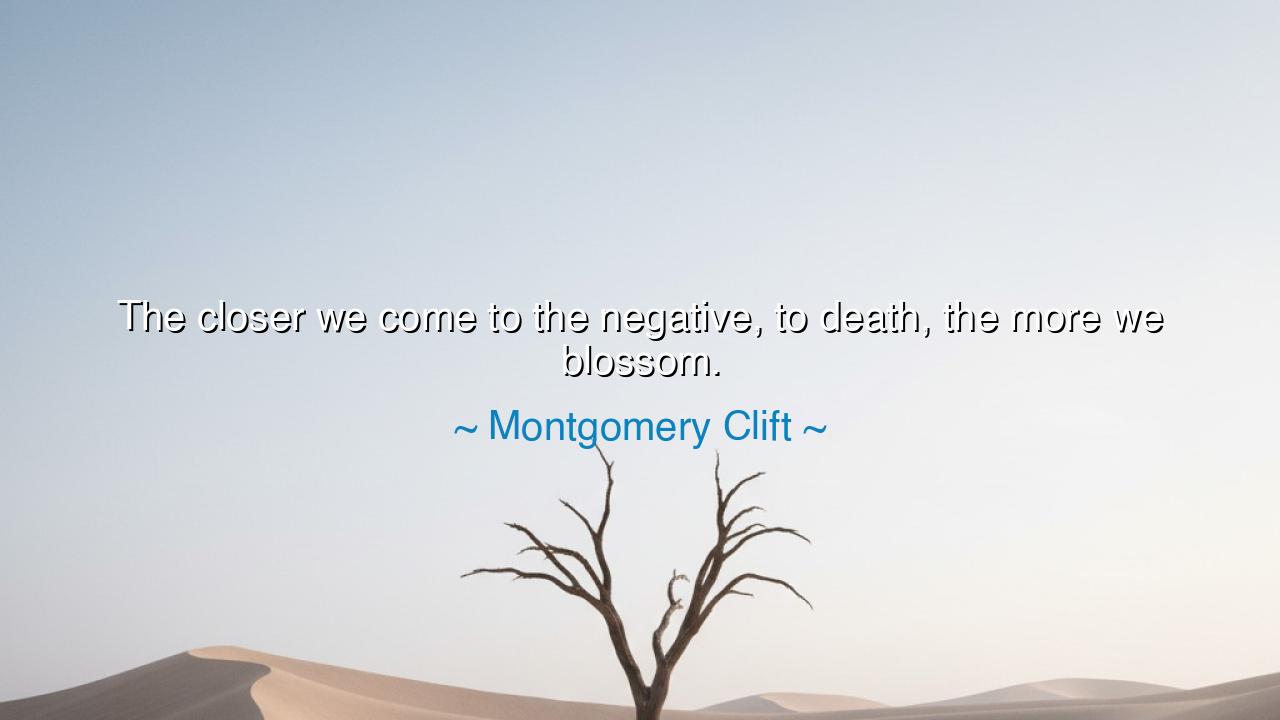
The closer we come to the negative, to death, the more we






The words of Montgomery Clift — “The closer we come to the negative, to death, the more we blossom.” — bloom from the soil of pain, beauty, and paradox. Spoken by one who lived between brilliance and despair, these words capture the eternal mystery of the human soul: that through suffering, we often find our deepest strength; through mortality, we awaken to the fullness of life. Clift, the haunted and luminous actor of the mid-twentieth century, knew intimately the fragility of existence. His life, marked by artistic genius and personal anguish, taught him that the soul ripens not in ease, but in struggle — that the flower of truth blooms most vividly on the edge of darkness.
Montgomery Clift was a star unlike others of his age. In Hollywood’s golden era, when perfection was worshiped, he brought something new: vulnerability, authenticity, and a raw humanity that seemed almost too pure for the screen. Yet behind the eyes that burned with life was a man who wrestled with pain — physical, emotional, and spiritual. After a car accident in 1956 left his face shattered and his spirit scarred, Clift entered a long battle with addiction and despair. Yet out of that suffering came performances of profound depth — in The Misfits, Judgment at Nuremberg, and Freud — works that revealed not the glamour of stardom, but the truth of the soul laid bare. It was through his wounds that he became most alive, most truthful, most blossomed.
His words echo the wisdom of the ancients. In the teachings of Buddha, it is said that “suffering is the source of awakening.” In the writings of Rumi, the great mystic poet, we are told, “The wound is the place where the light enters you.” Likewise, Clift’s insight is born from the same universal truth: that the closer we approach death, loss, and the negative, the more deeply we understand what it means to live. The shadow of death strips away illusions — it makes every breath precious, every act sacred, every love eternal in its transience. To stand near the abyss is to see how radiant the light truly is.
Consider the story of Vincent van Gogh, who, like Clift, carried within him both torment and transcendence. In his loneliness and despair, he painted the fields of Arles with the fire of his soul. His life was marked by darkness, yet his art glowed with color and vitality — sunflowers bursting with divine energy, stars swirling in cosmic dance. Van Gogh’s genius flowered as his life unraveled; he stood close to the negative, yet created beauty eternal. So too did Clift, in his suffering, uncover something that comfort could never reveal: the profound blossoming of the human spirit in the face of mortality.
This truth is not for the faint of heart. To blossom near death is to live with awareness — to accept that everything we love will one day pass away, and yet to love all the more fiercely because of it. The ancients called this awareness memento mori — “remember that you must die.” It was not a morbid reflection, but a call to awakening. When we remember death, we stop wasting life. We speak honestly. We forgive quickly. We cherish deeply. Clift’s words remind us that to bloom fully, we must face the soil from which we grow — and that soil is the dark earth of mortality itself.
The negative, then, is not our enemy but our teacher. Pain humbles us, loss clarifies us, and death gives meaning to the fleeting beauty of each moment. Like the lotus that rises pure and fragrant from the mud, the soul grows most luminous when it has descended into its own depths. The man who has never suffered may be content, but he has not known greatness; the one who has faced despair and still chooses to love — that man has truly blossomed.
So, my children, take this teaching to heart: do not fear the shadow, for within it lies your growth. When hardship comes, do not curse it; ask what it is teaching you. When loss arrives, do not flee it; let it show you the value of what remains. Live with the awareness of your own impermanence, and you will find, as Montgomery Clift did, that life becomes infinitely richer. For the flower that grows near death blooms not despite the darkness, but because of it. And in that sacred paradox lies the secret of all wisdom — that from the edge of ending, we discover the beginning of true life.






AAdministratorAdministrator
Welcome, honored guests. Please leave a comment, we will respond soon